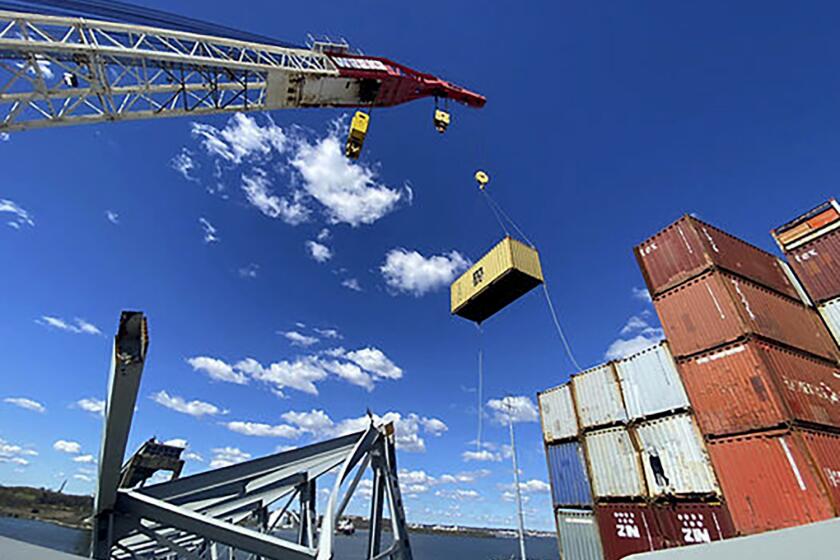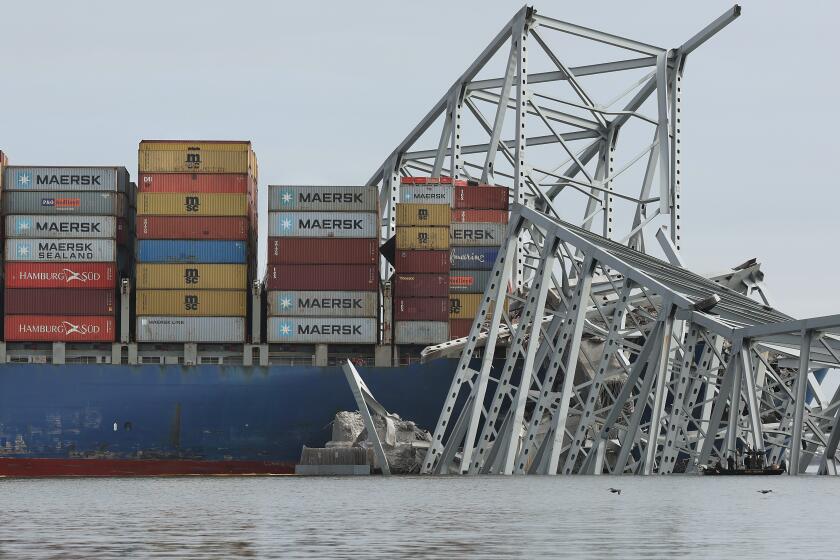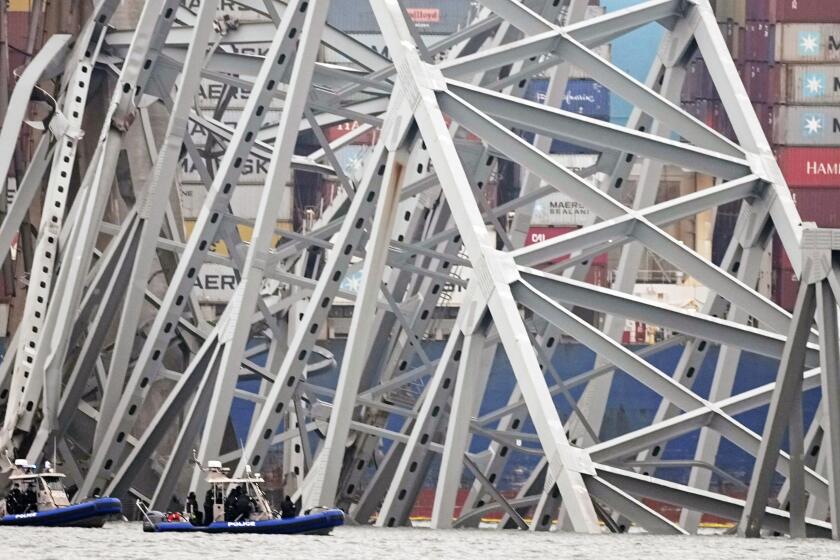Ship that caused bridge collapse had electrical issues while still docked, AP source says

- Share via
BALTIMORE — The massive container ship that caused the deadly collapse of a Baltimore bridge experienced apparent electrical issues before it left port but set out anyway, someone with knowledge of the situation told the Associated Press on Monday, hours after the FBI said it was investigating whether any laws might have been broken.
The Dali left Baltimore’s port early on March 26 laden with cargo destined for Sri Lanka when it struck one of the Francis Scott Key Bridge’s supports, causing the span to collapse into the Patapsco River and sending six members of a road crew plummeting to their deaths. Three of their bodies have been recovered.
The Dali experienced apparent electrical issues before leaving port, according to someone with knowledge of the situation. The person, who spoke on the condition of anonymity because they weren’t authorized to comment, said alarms went off on the ship’s refrigerated containers while it was still docked in Baltimore, likely indicating an inconsistent power supply.
The ship’s crew was aware of the issues and indicated they would be addressed, according to the person.
Officials with the National Transportation Safety Board have said their investigation will include an inquiry into whether the ship experienced power issues before starting its voyage.
Salvage crews have begun removing containers from the cargo ship that crashed into and collapsed the Francis Scott Key Bridge in Baltimore.
Board Chair Jennifer Homendy said last week that the investigation is focused on the ship’s electrical system generally. The ship experienced power issues moments before the crash, as is evident in videos that show its lights going out and coming back on.
Homendy said information gleaned from the vessel’s voyage data recorder is relatively basic, “so that information in the engine room will help us tremendously.”
The FBI said Monday that it is conducting a criminal investigation into the bridge collapse that is focused on the circumstances leading up to it and whether all federal laws were followed, according to a different person familiar with the matter. The person wasn’t authorized to discuss details of the investigation publicly and spoke to the AP on the condition of anonymity.
FBI agents were aboard the cargo ship on Monday conducting court-authorized law enforcement activity, the agency said in a statement. It didn’t elaborate and said it wouldn’t comment further on the investigation, which was first reported by the Washington Post.
Meanwhile, Mayor Brandon Scott issued a statement Monday announcing a partnership with two law firms to “launch legal action to hold the wrongdoers responsible” and mitigate harm to the people of Baltimore. He said the city needs to act quickly to protect its own interests.
Experts say the Baltimore collapse does not expose significant vulnerabilities in the major bridges near ports across California. The ports of Los Angeles and Long Beach handle about 40% of U.S. container imports from Asia.
Scott said the city “will take decisive action to hold responsible all entities accountable for the Key Bridge tragedy,” including the owner, operator and manufacturer of the cargo ship Dali, which began its journey roughly a half-hour before losing power and veering off course.
The Dali is managed by Synergy Marine Group and owned by Grace Ocean Private Ltd., both of Singapore. Danish shipping giant Maersk chartered the Dali.
Synergy and Grace Ocean filed a court petition soon after the collapse seeking to limit their legal liability — a routine procedure for cases litigated under U.S. maritime law. Their joint filing seeks to cap the companies’ liability at roughly $43.6 million. It estimates that the vessel itself is valued at up to $90 million and was owed over $1.1 million in income from freight. The estimate also deducts two major expenses: at least $28 million in repair costs and at least $19.5 million in salvage costs.
“Due to the magnitude of the incident, there are various government agencies conducting investigations, in which we are fully participating,” Synergy spokesperson Darrell Wilson said in a statement Monday. “Out of respect for these investigations and any future legal proceedings, it would be inappropriate to comment further at this time.”
The companies filed their petition under a provision of an 1851 maritime law that allows them to seek to limit their liability to the value of the vessel’s remains after a casualty.
The National Transportation Safety Board recovered the ship’s data recorder and will construct a timeline of events leading up to the crash.
Attorneys for some of the victims and a worker who survived the collapse argued Monday that the companies that own and manage the ship are taking advantage of an “archaic law” in attempting to protect their assets.
“Imagine telling that to grieving families … while they’re planning a funeral, the owner of the boat is in court,” attorney L. Chris Stewart said during a news conference in Baltimore.
The road crew “absolutely had zero warning” in the moments before the collapse, Stewart said, even though a last-minute mayday call from the ship’s pilot allowed nearby police officers to stop traffic from trying to cross the span. Three of the workers’ bodies are still missing, as crews continue the dangerous work of removing massive chunks of steel from the river.
Julio Cervantes, who survived falling from the bridge, narrowly escaped drowning by rolling down his work vehicle’s window and fighting through the frigid water despite being unable to swim, attorneys said. He clung to debris until he was rescued.
“This was all preventable,” Stewart said. “That is why we were brought in to investigate and find out what has happened and give these families a voice.”
The investigations come amid concerns about the safety of thousands of U.S. bridges and days after more than two dozen river barges broke loose and struck a closed span in Pittsburgh.
Tucker, Skene and Brumfield write for the Associated Press.
More to Read
Sign up for Essential California
The most important California stories and recommendations in your inbox every morning.
You may occasionally receive promotional content from the Los Angeles Times.
















